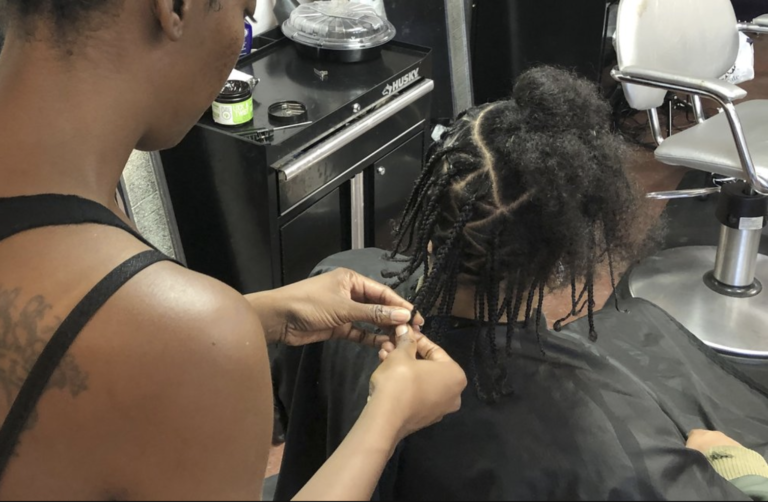URBANA – When Victor Figueroa got home from his private school in Chicago and started to wash his hair, he said he kept finding small pieces of paper in it.
Puzzled, Figueroa said he didn’t know where they were coming from.
One day while sitting in class, he turned around. He saw students holding small pieces of paper – poised to throw them into his hair.
Figueroa, who identifies as Black and Puerto Rican, had decided to grow his hair out that year. Although his hair did not meet his school’s dress code, Figueroa said the teachers had been more relaxed about dress code violations that year.
“After that I kind of just started cutting my hair,” Figueroa said. “It wasn’t until about five years ago that I just started wearing my hair back out again.”
The Chicago private school he attended had a rule that the students’ hair could not be long enough to touch their ears. Figueroa’s hair, which grew outward instead of downward, like many of his white classmates, could not be worn in the styles that he wanted to.
Under a new Illinois law, hair dress codes like this would be illegal, according to the Illinois State Board of Education. The law is named after Jett Hawkins, a Black child in Chicago who was told by his school that he couldn’t wear his hair in braids.
The law bans dress codes that say students can’t wear hairstyles traditionally worn by people of color including braids, locks and twists.
Although the new law would outlaw dress code policies that limit the hairstyles students can wear, Figueroa said he doesn’t believe discrimination against Black hair – which he’s faced – will end because of this law.
“The law can only go so far. There also needs to be a cultural shift as well on how we look at Black hair,” Figueroa said. “Unless our hair’s straightened or we got the number one buzz cut, we get treated differently.”
Schools should not dictate what students can and cannot look like, Lamont Holden, a music professor at the University of Illinois at Urbana-Champaign, said.
Holden, who is Black, said that there is a lot of pressure for students of color to assimilate into white culture.
Self-expression is extremely important to the well-being of students, Holden said. Even himself, he said he wasn’t comfortable growing out his hair and his beard because he didn’t want to make white people uncomfortable.
“We can’t control the texture of our hair. We can’t control the color of our skin,” Holden said. “Yet, you see how people react to it.”
Now, Illinois should make hair discrimination at work illegal, Figueroa said.
When he was told he needed to cut his hair in order to work at a Panda Express, Figueroa said he refused.
He said he realized that the discrimination he has faced because of his hair didn’t end when he graduated high school.
“I was just trying to get a job and you just told me that my natural hair that grows out of my head was the reason why I can’t have a job,” Figueroa said. “Every time I do something, there’s an excuse on why I can’t achieve something that I worked for.”
The Jett Hawkins law will go into effect in Illinois on Jan. 1.
Farrah Anderson is a student journalist with Illinois Public Media’s student newsroom. Follow her on Twitter @farrahsoa.

